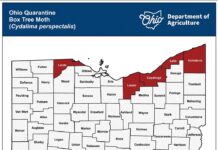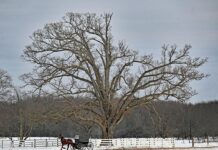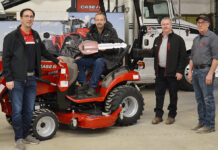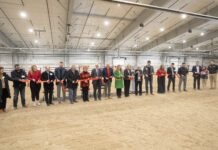NEWCOMERSTOWN, Ohio – Farming has its way of taking hold of lives, of families, of generations.
For Jerry Lahmers’ family in Tuscarawas County, Ohio, that hold is particularly tight.
His parents, his siblings, his children, all of them were raised with beef and corn and pasture in their genes and all of them have stayed true to that calling, one way or another.
Family ties. Look at Jerry. Raised just around the corner from where he lives now, he’s farming the ground his mother’s parents and his father’s parents used to farm together. One of his sisters operates a dairy, another a small beef herd. One brother is retired from Ohio State Extension, and two brothers also run cattle.
One son splits time between agronomy and helping his dad farm, another son does vet research.
Together, they keep the family’s agricultural roots very much alive.
The road to farming. Jerry was the one who was going to be a chemical engineer, not a farmer.
Armed with a degree from Ohio University, he stopped to think. Where would he live as a chemical engineer? What would he do? In the 1960s, his two options were either Columbus or Cleveland. There was no question; he knew he wouldn’t fit in either place.
So he headed to Ohio State for vet school. That seemed the logical thing. He could continue being close to the profession he truly loved: farming.
Dairy vet to beef farmer. Things went according to plan. He married his high school physics partner and started a dairy vet practice out of his garage.
Jerry spent 29 years traipsing from farm to farm and guessing which farmer was calling by what time it woke him during the night.
All the while, he raised two sons, Melvin and Kevin, with his wife, Rita, and managed hogs and crops.
In the late ’70s, after a long day visiting farms, Jerry came home with their first beef cow. He’d just helped deliver the Hereford-Holstein cross and figured she would be a good pet for the boys.
Gladys remained the only beef animal on the farm for several years until Jerry bought his mother’s cattle after his father’s death.
Twenty years went by and Jerry, then 55 and still spending long days as a vet, felt every one of them in his bones.
Palpating 90 cows an afternoon and then getting up in the middle of the night to help with a calving was too much.
In March 2000 he decided to do dairy nutrition work instead, still out of his garage. But that didn’t last long. His own cattle numbers were increasing and he soon decided to focus on his operation full time.
For the last several years, he’s done just that, feeding about 240 head, running 60 brood cows and growing crops on several hundred acres.
Father and son. The over-used saying is “like father, like son.” But for the Lahmers family, there should be a few additions: “Like brother, like sister; like great-grandma, like grandson; like uncles, like nephews; and then like father, like son.”
Like Jerry, his son Mel’s real love is in the fields and with the cattle; his “day job” as an agronomist is just the means toward someday farming full time.
But the Lahmers family legacy has passed down more than just this passion for farming. It’s emphasized that a sustainable farm has to be profitable and environmentally responsible.
Somewhere, sometime, Jerry read it takes 100 years to create an inch of topsoil. He doesn’t know if it’s true or how that would even be measured, but the idea stuck in his head and he’s determined to make his best effort toward that inch.
The best way? Take care of the land, he says.
In the 1960s, his father had the area’s first no-till corn planter, and Jerry and Mel continue to no-till farm today.
They keep all their brood cows on pasture, and outline manure management plans. It’s about keeping the environment healthy and that starts with the soil, they say.
Looking out for ag. Making agriculture, and this farm in particular, an opportunity for future generations is always the goal, Jerry and Mel said.
But it’s not enough to simply make sure this farm is profitable.
Jerry wants to change the community. He hosts zoning question-and-answer sessions in his living room and petitions for the economic development office to have an agriculture expert and questions why more isn’t being done to get ethanol production closer to his hometown, Newcomerstown.
It’s the same lesson in economic viability Jerry learned from his own father, Walter, many years ago. Walter had the foresight to buy all the available land surrounding his farm, knowing if he didn’t, it would end up in houses.
That effort didn’t go unnoticed, and Jerry and his siblings have all kept their pieces of the farm in agriculture even after their parents died.
To be continued? Jerry’s granddaughter, Autumn, isn’t even 3, but he’s already making sure the family’s farming roots are deep enough to sustain the next generation. If she wants to farm someday, Jerry wants that opportunity to be here, waiting for her.
If she’s anything like her grandfather and father and great-grandparents and aunts and uncles, she’ll be grateful for that chance.
(Reporter Kristy Hebert welcomes feedback by phone at 800-837-3419, ext. 23 or by e-mail at khebert@farmanddairy.com.)
Get 4 Weeks of Farm and Dairy Home Delivered










